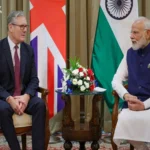A basic human right and a necessary resource for peace, growth, and survival, water is also Any disturbance in the delicate water-sharing agreements can have far-reaching effects in South Asia, where billions depend on shared rivers for agricultural, commercial, and human survival. Drinking water, Recent unilateral measures by India toward transboundary water sharing, especially the suspension of the Indus Waters Treaty (IWT), have caused concerns of “water terrorism” in the area. These acts mirror a concerning pattern of weaponizing water resources, transforming cooperation into conflict, and endangering regional peace and stability.
Signed in 1960 with World Bank mediation, the Indus Waters Treaty has long been pillar of water diplomacy between India and Pakistan. Having survived political changes and wars, it offers a paradigm of cooperation in an area prone to violence. India has declared a break from decades of accepted rules of peaceful water-sharing by unilaterally terminating its obligations under this pact.
This transgression compromises not just the treaty itself but also the integrity of international agreements negotiated by impartial world organizations. Such an action creates a troubling precedent wherein states, especially those in positions of upper riparian authority, may act unilaterally to manage shared watercourses without respect for international consensus or humanitarian concerns.
India’s current strategy toward the Indus Basin shows a more general pattern of coercive unilateralism. India has chosen methods that seem more punishing than diplomatic rather than looking for cooperative means to handle conflicts or issues. This shows a change from legal requirements under international water law and multilateralism.
When strong countries choose to disregard such conventions and pursue their own interests, it compromises the worldwide legal framework designed to guarantee fair distribution of resources and peaceful conflict resolution. The danger is not limited to one location; if such behaviour is accepted, it might undermine confidence in accords and raise the possibility of water conflicts all around the globe.
India’s actions have very significant and unsettling humanitarian consequences. With around 245 million people living in Pakistan, a downstream nation in the Indus River system, depends mostly on these waters. The foundation of Pakistan’s economy, agriculture practically runs on the Indus and its tributaries. Any disturbance in water flow, storage, or access can wipe off crops, relocate populations, and drive millions toward food and water shortage. One direct hazard to human security that directly violates international humanitarian norms and the right to water ingrained in many worldwide accords is the deliberate hiding or manipulation of water flows.
Moreover, the delicate peace in South Asia is seriously threatened by the concept of utilizing water as a tool of coercion or geopolitical negotiation. Water cannot be handled as a strategic weapon. This is a common natural resource meant to enable development and life. India is not only endangering regional harmony but also violating the fundamental precept of international water law, equal and reasonable use, by depriving downstream towns of basic water access. Should India keep down this road, other riparian nations throughout the globe could feel empowered to follow suit, setting off a series of conflicts and catastrophes.
One cannot stress the effects on the ecology of upsetting the flow of the Indus River. For ecosystems and species all throughout South Asia as well as for people, the river represents a lifeline. Its watershed provides huge marshes, woodlands, and habitats vital for diversity. Rapid changes in water supply could throw off these ecosystems, lower groundwater levels, degrade soil, and influence climate patterns. As hydroelectric projects, irrigation systems, and fisheries all suffer from inconsistent river flows, the economic knock-on impacts would be similarly severe. This would impact not only Pakistan but also areas of northern India, where populations likewise rely on the Indus system.
Given India’s nuclear posture and Pakistan’s as well, these acts are particularly concerning in the larger geopolitical sense. Any provocative action, especially one that concerns basic survival, runs the danger of tipping the scale into open conflict given an already stressed relationship. Once thought of as a far-off dystopian worry, water wars are starting to be a serious threat.
In such a dangerous setting, the weaponizing of a resource as vital as water is blatantly reckless and requires immediate worldwide attention. Both nations have to give communication first priority and commit to cooperative frameworks acknowledging their shared character of their natural resources, instead of raising tensions.
India’s road forward is for it to promptly resume its obligations under the Indus Waters Treaty and open honest, sincere negotiations with Pakistan. The World Bank and the United Nations among other international entities have to be more involved in mediating and observing water conflicts in the area. Equally crucial is the need of both countries to embrace sustainable water management techniques, make technological investments to cut waste, and guarantee equitable and ecologically sensible distribution of river supplies.
India has to also take long-term effects of its present activities into account. Although Pakistan may be the target today, internal water problems inside Indian states, many of which are also suffering severe shortages and conflicts, may surface tomorrow. Cooperation, openness, and mutual respect define the solution rather than dominance. Fair water-sharing policies define regional stability, economic progress, and human dignity as well as other aspects. Nations create the basis for enduring peace and wealth when they view water as a shared asset instead of an instrument of dominance.
India’s latest activities on the Indus Waters Treaty mark a risky escalation of water-based coercion endangering regional security, human life, and international principles. Water is life; it should never be seen as a bargaining chip in geopolitical games. South Asian people deserve better since their lives are entwined with rivers crossing boundaries and cultures. They merit policies anchored in peace, sustainability, and fairness. The spectre of water terrorism can be banished only by communication and respect of international law, therefore guaranteeing a stable, safe future for the whole area.








